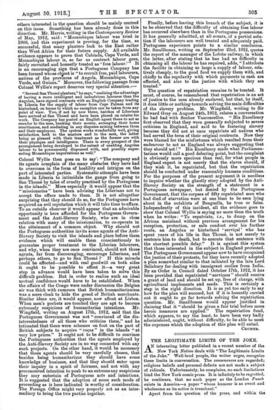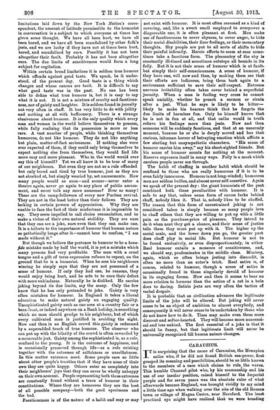THE LEGITIMATE LIMITS OF THE JOKE.
ANinteresting letter published in a recent number of the New York Nation deals with " The Legitimate Limits of the Joke." Well-bred people, the writer urges, recognize these limits in conversation. The convenances are regarded; religious beliefs and personal defects are not made a subject of ridicule. Unfortunately, he complains, no such limitations bind the New York comic press. It is infinitely to be regretted, he continues, that no such paper as the London Punch exists in America—a paper " whose humour is as sweet and wholesome as its satire is trenchant."
Apart from the question of the press, and within the limitations laid down by the New York Nation's corre- spondent, the amount of latitude permissible to the humorist in conversation is a subject to which everyone at times has given some thought. We have all been hurt, we have all been bored, and we have all been scandalized by other folk's jests, and we are lucky if they have not at times been hurt, bored, and scandalized by ours. Possibly it has not been altogether their fault. Probably it has not been altogether ours. The due limits of sensitiveness would form a long subject for cogitation.
Within certain broad limitations it is seldom true humour which offends against good taste. We speak, be it under- stood, of the present day. Good taste is a thing which changes and whose canons are tacit. It is difficult to say what good taste was in the past. No one has been able to define what true humour is, but it is easy to say what it is not. It is not a mixture of cruelty and facetious- ness, nor of gaiety and laughter. It is seldom found in jocosity not very often in chaff. It has very little to do with jollity and nothing at all with buffoonery. There is a strange elusiveness about humour. It is the only quality which every man and woman in the world believe themselves to possess, while fully realizing that its possession is more or less rare. A vast number of people, while thinking themselves humorous, do not like humour. They do not like anything but plain, matter-of-fact seriousness. If nothing else were ever expected of them, if they could only bring themselves to expect nothing else from themselves, they would find life more easy and more pleasant. Who in the world would ever say this of himself ? Yet we all know it to be true of many of our neighbours. But even they are not as a rule offended but only bored and tired by true humour, just as they are not shocked at, but simply wearied by, set amusements. How many people would as soon—and sooner—never enter a theatre again, never go again to any place of public amuse- ment, and never talk any more nonsense? Ever so many ! These are the camp-followers of every new Puritan revival. They are not in the least better than their fellows. They are lacking in certain powers of appreciation. Why they are unable to face the fact of their misfortune it is impossible to say. They seem impelled to call choice renunciation, and to make a virtue of their own natural stolidity. They are sure that they can see a joke, sure even that they can make one. It is a tribute to the importance of humour that human nature so pathetically longs after it—cannot bear to confess, "I am made without IL" But though we believe the pretence to humour to be a bona- fule mistake made by half the world, it is yet a mistake which many persons find very profitable. The man with a cruel tongue and a gift of terse expression refuses to repent, on the ground that he is a humorist. When he sees his neighbours wincing he simply says that they are not possessed of a sense of humour. If only they bad one, he reasons, they would enjoy being hurt, and he sets to to cure their defect with more unkindness. Naturally he is disliked. He carries joking beyond its due limits, say the many. Only the few know that he has only pretended to joke. Gaiety is very often mistaken for humour. In England it takes a liberal education to make natural gaiety an engaging quality. Unsophisticated gaiety such as one sees at a country fair or a bean-feast, or indeed anywhere on a Bank holiday, is something which no man should grudge to his neighbour, but of which every cultivated man is justified in avoiding the sight. Now and then in an English crowd this gaiety is redeemed by a superadded touch of true humour. The observer who can put up with the hilarity of the crowd is often rewarded by a memorable jest. Gaiety among the sophisticated is, as a rule, confined to the young. It is the outcome of happiness, and is occasionally preserved through life—as a rule existing together with the extremes of selfishness or unselfishness. In this matter extremes meet. Some people care so little about other people's troubles that if they have none of their own they are quite happy. Others enter so completely into their neighbours' joys that they can never be wholly unhappy on their own account. People representing both these extremes are constantly found 'without a trace of humour in their constitutions. Where they are humorous they are the best of all possible company—both the good specimens and the bad.
Facetiousness is of the nature of a habit and may or may not exist with humour. It is most often assumed as a kind of covering, and, like a sweet smell employed to overpower a diagreeable one, it is often pleasant at first. Men make use of facetiousness to cover shyness, to cover anger, to hide their social disabilities, their finer feelings, or their momentary thoughts. Shy people are put to all sorts of shifts to hide their painful infirmity. Heroic efforts to seem at ease some- times take a facetious form. The pleasantry of the shy is constantly ill-timed and sometimes outsteps all bounds in its folly. But it is not their sense of humour which is at fault, but simply their self-consciousness. A sense of humour, if they have one, will now and then, by making them see that their efforts are ludicrous, bring them back again to a seriousness sufficient to save their self-respect. Extreme nervous irritability often takes cover behind a superficial jocosity. When a man is feeling very cross he cannot speak amiably, whether he preach a sermon or strain after a jest. What he says is likely to be bitter— likely to make his hearers think that he forgets the due limits of harmless fun. Only he himself knows that he is not in fun at all, and that oaths would in truth relieve his feelings more than jests. Now and then someone will be suddenly facetious, and that at an unseemly moment, because he or she is deeply moved and has that curious, inhuman horror of betraying emotion which afflicts a few sterling but unsympathetic characters. "His sense of humour carries him away," say his short-sighted friends. But his sense of humour counts for nothing at the moment. Reserve expresses itself in many ways. Folly is a mask which careless people never see through.
The habit of chaffing is another habit which should be confined to those who are really humorous if it is to be even fairly innocuous. Humour is not long-winded ; humorous men are seldom bullies, and almost never self-assertive. Again we speak of the present day : the giant humorists of the past combined both these peculiarities with humour. It is safe to say that, unless some form of caress lurks behind chaff, nobody likes it. That is, nobody likes to be chaffed. The reason that this form of unrestrained joking is not considered taboo is simply because so many people love to chaff others that they are willing to put up with a little pain as the purchase-price of pleasure. They intend to do it when next they get a chance, and their sense of justice tells them they must put up with it. The higher up the social scale, and the lower down you go, the greater part does chaff play in social life. But humour is not to be found exclusively, or even disproportionately, in either Real humour entails a measure of sensitiveness, and, we should say, predominates in the middle class. Mimicry, again, which so often brings jesting into discredit, is often no more than an actor's trick. Real satire is, of course, related to humour, though a sense of satire is occasionally found in those singularly devoid of humour in its engaging forms. Now and then it seems to bear no more relation to humour than the action of a rat in a hole does to daring. Satiric jests are very often the tactics of verbal despair.
It is probable that as civilization advances the legitimate limits of the joke will be altered. But joking will never cease to be an object of ambition to almost everybody, and consequently it will never cease to be undertaken by those who do not know how to do it. Time may, make even them more discreet and softer-hearted. They will become more nonsensi- cal and less unkind. The first essential of a joke is that it should be funny, but that legitimate limit will never be universally recognized till human nature changes.



































 Previous page
Previous page